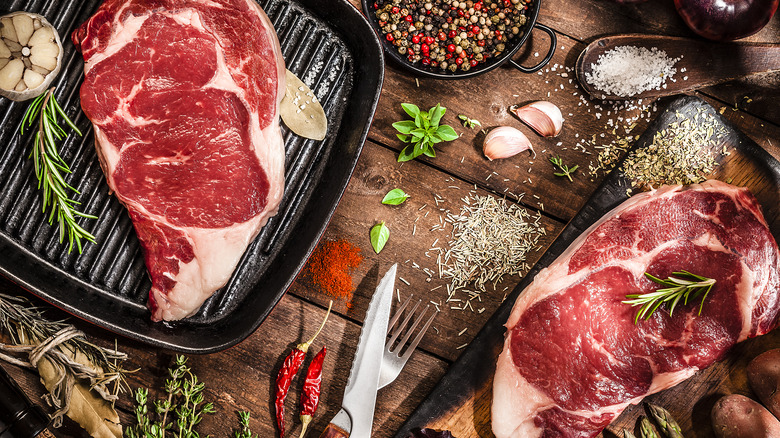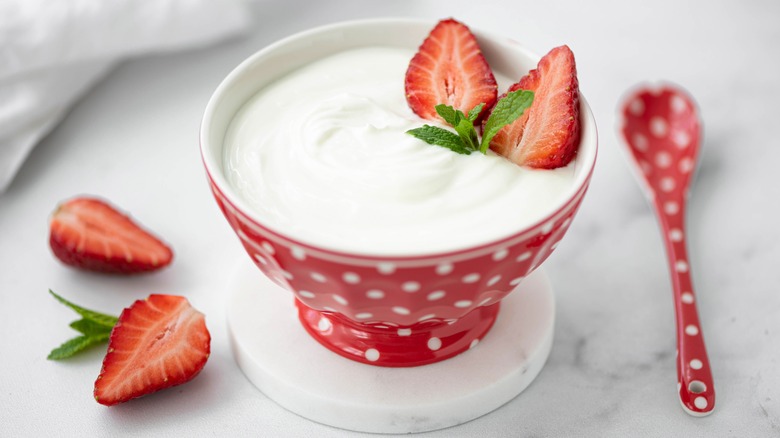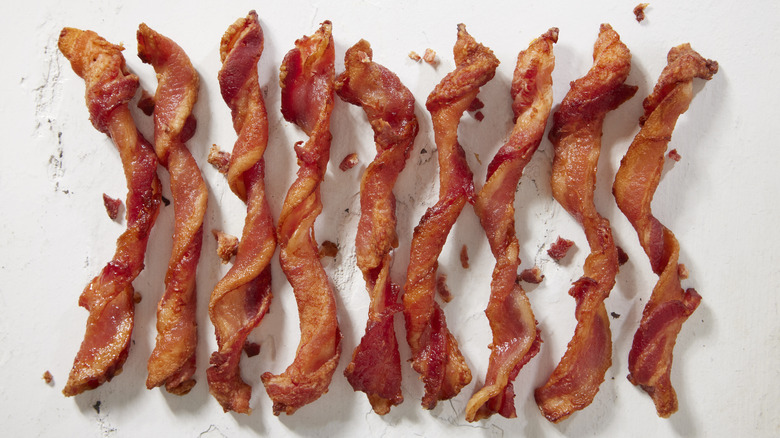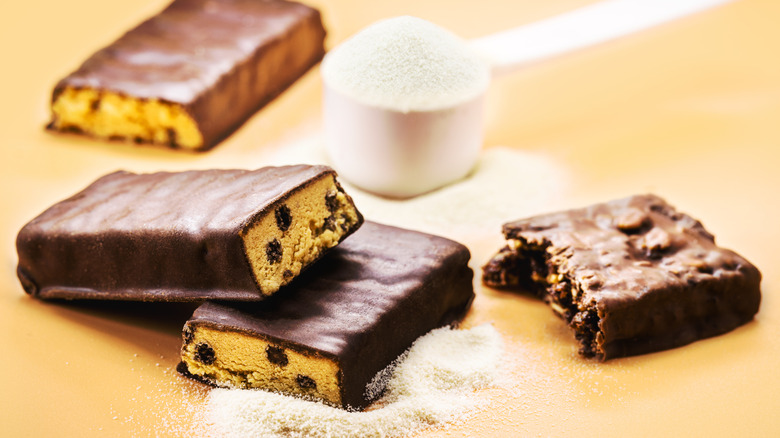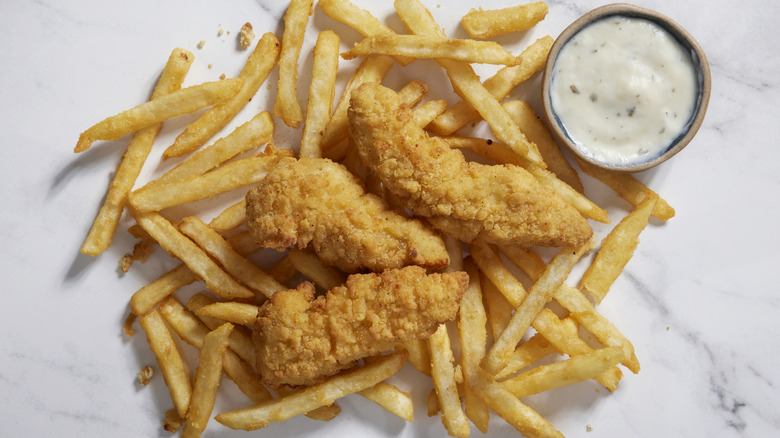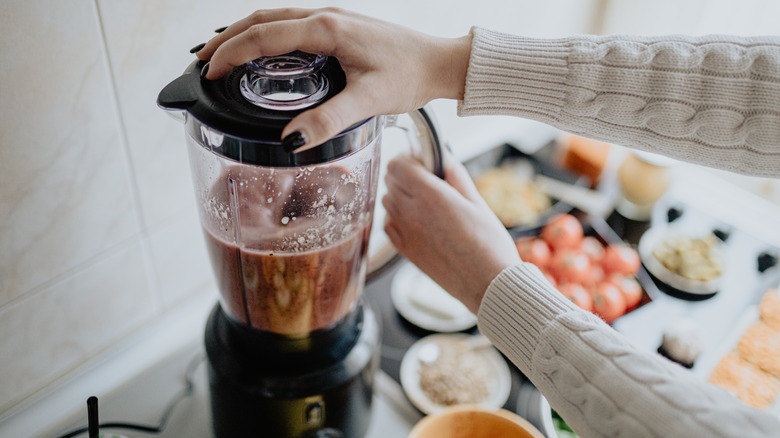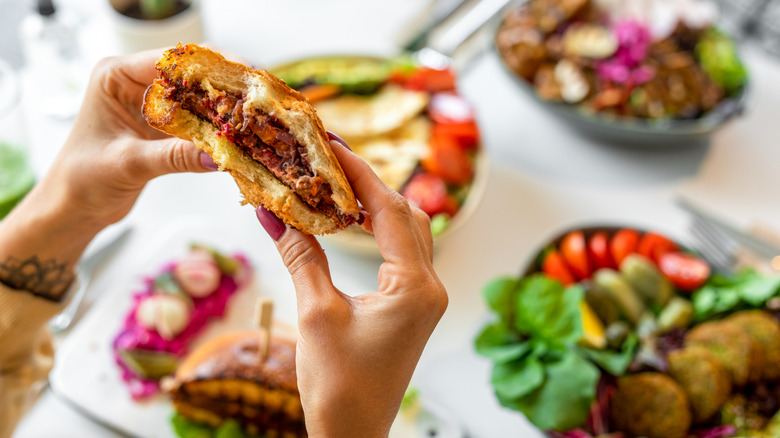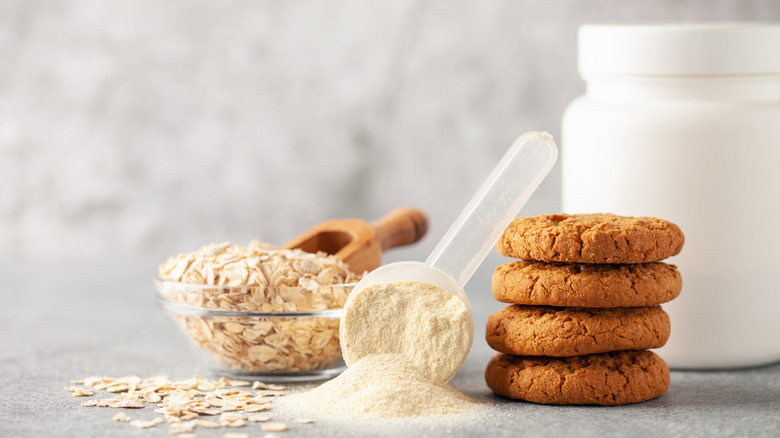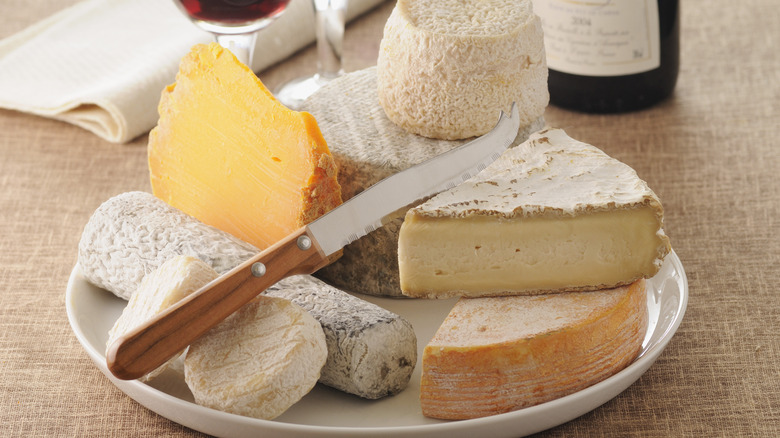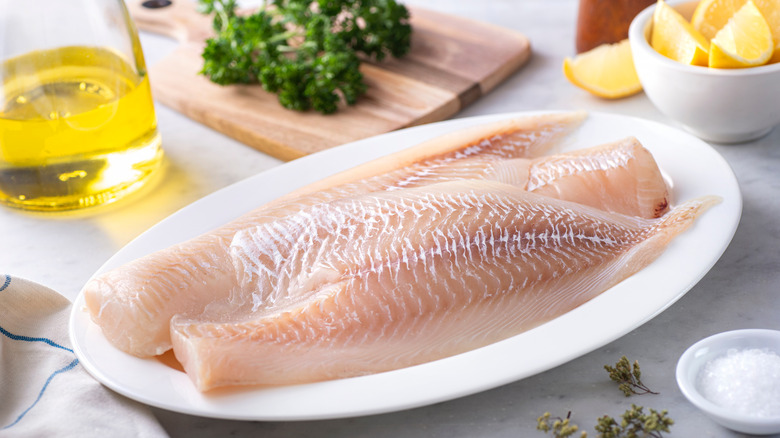Popular Proteins That Could Hinder Your Weight Loss Goals
Protein is the fundamental building block of all the tissues in your body. It builds and repairs muscle, heals wounds, and makes your bones, hair, skin, and nails healthy and strong (via Piedmont). But it doesn't stop there. Protein is a vital part of your red blood cells that help transport oxygen and nutrients throughout your body. It also helps produce enzymes that enable you to digest the food you eat, and it regulates your hormones to keep your body in balance.
Protein has also been shown to aid weight loss. Adding more protein to your diet could help you feel fuller at meals and stay full for longer. In combination with exercise, it can help you preserve lean muscle mass and alter your body composition. Protein is also harder for your body to store as fat compared to carbohydrates or dietary fat (via NASM).
For all those reasons, getting enough protein in your diet is a good idea. However, it's important to choose your protein sources wisely. Some popular protein choices have excessive amounts of fat and sugar. Eating those regularly can actually hinder your health and weight-loss goals.
Red meat
A juicy burger is high in protein, with 20 grams in 4 ounces of beef (via USDA FoodData Central). A beef tenderloin steak has 35 grams of protein. No doubt, these are tasty protein options, but they're not the best choices when your goal is weight loss — especially not if you eat them often.
Research suggests a potential link between frequent red meat consumption and weight gain (via National Institutes of Health). This connection is likely due to the calorie density and fat content in many types of red meats. A 4-ounce burger patty made with 80% lean ground beef has 287 calories and almost 23 grams of fat, and a beef tenderloin has 435 calories and 32 grams of fat. To put that in perspective, it helps to compare it to leaner protein sources like light-meat chicken and fish. A chicken breast without skin has 165 calories and 3.5 grams of fat, and a tilapia filet has only 128 calories and 2.5 grams of fat.
That's not to say that all red meat is bad. If you opt for leaner sources, you can avoid the excessive calorie and fat intake. A beef patty made with 95% lean ground beef has only 155 calories and a little less than 6 grams of fat, along with 24 grams of protein. Choosing leaner cuts and other sources of lean protein can help you cut the calories necessary to lose weight, especially when combined with regular exercise.
Flavored Greek yogurt
Greek yogurt is thick and creamy and feels indulgent. And it's a rich source of protein, with as much as 16 grams per serving (via USDA FoodData Central). It makes a satisfying and filling breakfast with fresh fruit, and it's a great option to cut the calories of some of your favorite dips and dressings. But not all Greek yogurt is created equal. Most flavored varieties have a surprising amount of added sugar that can balloon the calorie count and make your breakfast more of a dessert.
For example, one brand of flavored Greek yogurt has 15 grams of added sugar per serving. That's about three times as much as a serving of plain Greek yogurt. The flavored yogurt also has 200 calories per serving, whereas the plain yogurt has a little less than 100 calories. Here's another major difference: the flavored variety only has 7 grams of protein. Opting for flavored yogurts can double your calorie intake and triple your sugar intake, but cut your protein intake in half.
It's always best to choose plain Greek yogurt when your goal is weight loss. There are plenty of low-sugar additions that can add flavor to your yogurt and make it anything but plain. Add fresh fruit and warm spices like cinnamon and nutmeg, or top your bowl with some low-sugar granola. Applesauce with no added sugar is another way to add light sweetness. Swirl in a couple of tablespoons and add a pinch of cinnamon.
Processed meat
Red meat isn't good for weight loss, but processed meat is even worse. Cold cuts, sausages, hot dogs, and bacon are all rich in protein, but they're also fat and calorie bombs. Take bacon, for example. One ounce has 125 calories and 10 grams of fat (via USDA FoodData Central). But most people have more than that amount in a sitting. That's one of the main problems with processed meats: they're easy to overeat. Plus, they're often consumed in a setting that is conducive to overeating; think piling ham and salami on a deli sub. Not to mention that rarely is a hot dog served with a side salad. Usually, processed meats are paired with other processed, fatty, and high-calorie foods, like french fries and chips.
All processed foods — meats, as well as sweets, snack foods, and convenience foods — have been linked with an increased risk of weight gain (via NIH). Whether because of the fat and calories they contain, how easy it is to overeat them, or the unhealthy foods they're normally served with — or a combination of the three — eating processed meats regularly is going to derail your diet and your weight loss success.
Protein and meal-replacement bars
Protein and meal-replacement bars come in handy when you're running behind and don't have time to eat real food. But proceed with caution. Many commercially available protein bars contain surprising amounts of added sugar. One popular bar has 16 grams of added sugar. Read the ingredients list, and you'll find brown rice syrup, tapioca syrup, and cane syrup. That's more like a candy bar than anything that could be considered nutritious.
Remember that added sugars provide calories and no nutrition. They don't fill you up or make you feel satisfied after eating. That's why they're called "empty calories." Added sugar can also spike your blood sugar, leading to a blood sugar crash that can make you feel tired and hungry again soon after eating (via Medical News Today). You might even find yourself craving another sugary snack. This can cause you to overeat and overdo your calorie budget.
Getting your nutrition from whole foods is best, whenever possible. Keep some quick and easy snacks on hand when hunger strikes that are high in protein and fiber and low in added sugars. Nuts and fruit, veggies and hummus, hardboiled eggs, and apples with peanut butter are all whole-food snacks that can fill you up without all the empty calories. And if you need to eat a protein bar, look for varieties with fewer than 5 grams of added sugar per bar and ingredients that are mostly whole foods.
Fried chicken
Chicken is a great source of protein. But whether it will help or hurt your weight loss goals depends on how it's prepared. A plain chicken breast weighing 3.5 ounces has 158 calories, 3 grams of fat, and 32 grams of protein (via USDA FoodData Central). That same amount of breaded and deep-fried chicken has 384 calories, 28 grams of fat, and only 14 grams of protein.
In a vacuum, calories from fat aren't any different from calories from protein. However, the way your body digests them and the effects they have on your metabolism make fats inferior when it comes to weight loss. According to research, protein has a significantly higher metabolic cost. This means your body expends more energy digesting it — as much as 30 times that of fat (via an article in the Journal of Obesity & Metabolic Syndrome).
Fried foods also affect your microbiome, which is the collection of good and bad bacteria in your gut. The microbiome plays an important role in overall health and weight management. Research shows that the saturated fats in fried foods negatively affect the balance of bacteria in your gut and may lead to weight gain (via Nature Communications).
That doesn't mean you should avoid all fat. Unsaturated fats from fish, nuts, and avocados are necessary for good health. But fried foods contain mostly unhealthy saturated fats that can be harmful to your health. A diet rich in unsaturated fats can actually aid weight loss and maintenance, per a paper in Frontiers in Nutrition.
Protein shakes
Most people can get all the protein they need by eating three meals a day. Even if you're trying to boost your protein intake for weight loss, you shouldn't have to supplement with protein shakes. Doing so could actually hurt your efforts for a few reasons.
Protein shakes are often calorically dense. This is especially true if you make them with store-bought protein powder mixes or grab a protein drink from your local smoothie shop. Premade powders and shakes tend to be high in sugar to make them more palatable to consumers. Some powders can have as much as 23 grams of added sugars — the same amount in some candy bars (via Harvard Health Publishing). One protein shake from a national smoothie chain has 55 grams of sugar in a medium size. That's more than the amount in a 16-ounce soda.
Making your own shakes at home is a better option, but not without its problems. Most people don't follow a recipe when they make a shake. They throw in a little of this and a little of that. High-calorie additions like nut butters, although good for you, can balloon the calorie count if you don't measure carefully. Suddenly, your 8-ounce, 300-calorie shake turns into a 16-ouncer with more than a third of your daily calorie needs.
If you're going to drink shakes, it's important to read labels and follow recipes when making your own. You also have to make sure the shake fits into your total calorie budget for the day.
Vegan meat substitues
If you're trying to go meat-free, meat substitutes might be your go-to protein source. But what many consumers don't realize is that vegan meats can have the same amount of fat and calories as red meat. One brand of plant-based "beef" has 231 calories and 13 grams of fat in a 4-ounce serving, and the same amount of ground beef has 240 calories and 17 grams of fat. They also contain about the same amount of saturated fat.
It's not uncommon to think that anything plant-based is automatically good for you. But vegan meats are processed foods, and research shows that eating a lot of processed foods is directly correlated with long-term weight gain (via Harvard T.H. Chan School of Public Health). While these products aren't as bad as many other processed foods, it's still important to read labels and choose options made with mainly whole-food ingredients and healthy fats.
That said, there are benefits to choosing plant-based meat products over animal products that have little to do with weight loss. Since red meat is also prohibitive to shedding pounds, choosing plant-based meats when a burger craving strikes is better for animals and the environment.
Protein cookies
Marketing tactics come in all shapes and sizes. Putting "high protein" on baked treats is just one of the ways manufacturers can trick consumers into thinking their product is healthy. However, cookies are cookies, whether they have some extra protein added or not. One brand of protein cookie has 400 calories, 10 grams of fat, and 24 grams of sugar. It's made with refined wheat flour, which spikes your blood sugar, in addition to cane sugar, invert sugar, and sugary sprinkles. Per the nutritional facts, a serving is half a cookie; but there aren't many people who have the self-control to eat half a cookie and put the other half away for another day.
Now for the good news: The cookie does have 16 grams of protein. It also has 10 grams of fiber. Like protein, fiber has been shown to aid weight loss because it provides bulk to your diet but no calories (via Healthline). Eating more fiber with meals and snacks can help you feel fuller with less food. Fiber can also blunt the effects of sugar on your blood glucose (via a paper in Foods).
Conclusion: Just because you're trying to lose weight doesn't mean you can't have a cookie every now and then. If you're going to treat yourself, choosing an option with a little extra protein added — and fiber — is a good choice. You just have to be mindful not to overdo it.
Cheese
Starting with the good news: In moderation, cheese isn't bad for you. It's rich in protein, and is a good source of calcium, zinc, and vitamins D and B12 (via WebMD).
The problem with cheese is that it's very calorically dense. A recommended serving size for cheese is 1 ounce, per Healthline. That's about the size of two dice for hard and semi-hard cheeses like cheddar and parmesan (via Proudly Wisconsin Cheese). An ounce of softer cheeses like brie is approximately a thumb-size portion (via Healthline). Most people eat far more than that in a sitting, and the calories quickly add up. For example, 1 ounce of cheddar cheese has 114 calories. If you eat 3 ounces (about 6 diced-sized cubes), that's 342 (via University of Rochester Medical Center).
It's too easy to overdo it with cheese when you're trying to lose weight. But that doesn't mean you should deprive yourself. As with any high-calorie food, moderation is key. Measure out your portion rather than eating straight from the wedge. Pair it with other low-calorie, high-fiber foods like cut veggies, so you have something else to fill you up. You can also choose lower-calorie cheeses like part-skim mozzarella, which has 85 calories per ounce, and feta cheese, which has a little over 70 calories per ounce (per USDA FoodData Central). Cheese labeled low-fat will also contain fewer calories.
Best protein sources for weight loss
Poultry, such as skinless chicken and turkey, is a top choice for lean protein. These meats are not only low in fat but also rich in essential amino acids, making them ideal for muscle repair and growth. Grill, bake, or roast poultry with minimal added fat for a low-calorie, high-protein meal.
Fish, particularly varieties like salmon, tuna, and cod, are not only packed with protein but also heart-healthy omega-3 fatty acids. Grill or bake fish as opposed to frying.
Eggs are a versatile and cost-effective source of high-quality protein. While the yolk contains some fats, the egg whites are virtually fat-free and high in protein. Incorporating eggs into meals, whether boiled, scrambled, or in omelets, provides an easy and satisfying protein boost.
Legumes, including beans, lentils, and chickpeas, are excellent plant-based sources of lean protein. These options are also high in fiber, aiding digestion and promoting a feeling of fullness.
Plain Greek yogurt is high in protein and offers probiotics that can improve gut health. Choose low-fat or fat-free unsweetened Greek yogurt, and enjoy it on its own with fruit as a base for smoothies and dressings.


